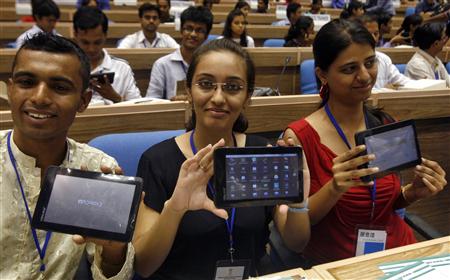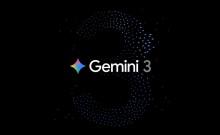
The launch of India's first indigenously developed and made computer tablet (an ultra low-cost one, at that) - the Aakash - witnessed a terrifically positive initial response. Manufactured by DataWind, the tablet, sold 30,000 units in its first week and although sales did drop alarmingly, in the face of significantly better equipped tablets from foreign manufacturers, the threat from Aakash's upgraded cousin - UbiSlate 7 - could be here to stay.
Aakash, despite being priced at the extremely competitive mark of Rs. 2,500, had several chinks in its armour. The most notable were its slow processor speed, weak battery life and poor connectivity options.
However, DataWind's second attempt - the UbiSlate 7 - shows more promise, with better features and specifications that make it an ideal candidate for the main course.
It is scheduled for a Jan. 2012 release, at the marginally higher price of Rs. 2,999. The device is now available for pre-orders.
In the light of UbiSlate 7's forthcoming launch, here is a comparison between the two:
Connectivity Options: The lack of GPRS support and slower Wi-Fi connectivity speeds are major deterrents for Aakash in rural areas with congested network bandwidth and insufficient infrastructure for wireless connectivity. These shortcomings defeat the very objective of bridging the technological gap between rural and urban India through an absolute budget-friendly device like Aakash.
On the contrary, the UbiSlate 7 brings the flexibility of GPRS support alongside a faster Wi-Fi connectivity option. Besides, two regular USB 2.0 ports add support for connecting external devices like pen-drives, web-cams, dongles, keyboards and portable hard drives. Furthermore, the option of support for 3G modems is welcome. This is something that can overcome shortcomings with overloaded Wi-Fi hotspots and congested networks.
Access to Android Market: The UbiSlate 7 adds support for downloading various games, software and over 1, 50, 000 Apps from the lush world of the Android market. It seems a smart move from DataWind, as this option is non-existent on the original Aakash.
Extended Support: The UbiSlate 7 undoubtedly yields more value for money with its extended support for voice calls, GPRS, 2GB onboard Flash storage and HD video playback besides other common traits found on Aakash. Furthermore, Datawind's patented acceleration technology is expected to provide faster web access, even through GPRS, across the country.
Front-Facing Camera: The upgraded version is expected to have a front-facing camera enabling video chat, which is a big minus on the original Aakash.
Battery Life: Battery-life is the key USP for any portable device with a rich feature set. Armed with only a 2,100mAh battery, the Aakash tablet delivers a disappointing 3 hours of battery life. The UbiSlate 7, on the other hand, comes with a more powerful 3, 200mAh battery and can deliver, according to reports, a more impressive 4 to 5 hours of operation on a single charge.
System Performance: The Aakash, running the outdated Android 2.2 platform coupled with a sluggish ARM11 - 366MHz processor, had several problems on the performance front. Meanwhile, the UbiSlate 7 promises greater performance and stability with a faster Cortex A8 - 700MHz processor and a dated Android 2.3 platform.
Besides, the addition of a graphics processor and a HD video processor on the upgraded tablet boosts the video playback quality while also accelerating graphics applications for a superior overall system performance. In addition, with the 2GB onboard Flash storage on the UbiSlate, users should be able to look forward to superior data access speeds. Unlike the original, the upgraded tablet is also expected to ship with a capacitive touch screen, which should translate to superior touch feedback and better usability.
Thus, for all these reasons, the UbiSlate 7 is, perhaps, the best tablet for those Indians on a tight budget. It is clearly better than its predecessor and deserves a few accolades.








